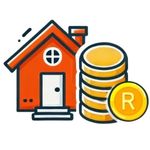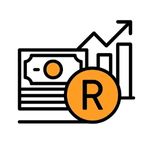
Interest rates play a central role in how South Africans manage debt, savings, and everyday finances. Whether you’re repaying a bond, using a credit card, or saving for the future, the rate applied can significantly affect your monthly budget and financial goals. In South Africa, these rates are influenced by decisions made by the South African Reserve Bank, particularly through adjustments to the repo rate. These changes affect everything from loan repayments to savings returns.
Key Takeaways
- Interest Rates Influence Both Borrowing And Saving: The interest rate determines how much you pay when borrowing and how much you earn when saving. Changes in this rate directly impact loan repayments and savings returns.
- SARB Controls The Repo Rate: The South African Reserve Bank adjusts the repo rate to manage inflation and economic activity. This rate shift affects the prime lending rate used by banks for personal, home, and business loans.
- Consumers Should Adjust Financial Habits Proactively: Monitoring rate announcements, reducing debt, reviewing budgets, and comparing costs can help South Africans better manage their finances during periods of rate changes.
What Is Interest Rate?
Before breaking down how interest rates influence your personal finances, it helps to first understand the basic concept. An interest rate refers to the percentage charged on money borrowed or earned on money saved over a set period.
When you borrow money through a loan or credit agreement, the interest rate is the fee the bank or lender charges for granting you access to those funds. This fee is applied as a percentage of the amount you borrow and is paid back along with the loan.
On the other hand, if you deposit money into a savings account, the interest rate represents the return the bank offers you for keeping your funds with them. This return is also calculated as a percentage and is paid out periodically.
In South Africa, the Reserve Bank adjusts interest rates as part of its effort to control inflation and stabilise the economy. When inflation rises too quickly, the Bank may increase interest rates to reduce consumer spending and borrowing. If economic activity slows down, the Bank may lower interest rates to make loans more affordable and stimulate growth.
A simple way to think of interest is to compare it to paying rent. Borrowing money is like renting it from a lender, and interest is the rent you pay for using that money. The cost is calculated based on the original loan amount and added to your monthly repayments.
The South African Reserve Bank’s Role
The South African Reserve Bank (SARB) holds a central responsibility in shaping the country’s interest rate environment. It establishes a key interest rate known as the repo rate, which refers to the rate at which commercial banks obtain short-term funding from the Reserve Bank. When the SARB adjusts this rate, it has a direct effect on the lending and savings rates offered by banks to individuals and businesses, influencing everything from loan repayments to returns on fixed deposits.
About Arcadia Finance
Get your loan quickly and easily with Arcadia Finance. There are no application fees, and you can compare offers from 19 trusted lenders, all registered with the National Credit Regulator. It’s a safe and simple way to find a loan that suits your budget.
How Interest Rates Affect Your Finances
Interest rates influence nearly every part of your personal finances in South Africa. Whether you are borrowing, saving, or investing, the interest rate set by the South African Reserve Bank (SARB) can determine how much you pay or earn. Below is a breakdown of the most common ways interest rates affect your money.

Personal Loans and Credit Cards
When interest rates increase, borrowing becomes more expensive. This includes personal loans, payday loans, and credit card debt.
- Higher monthly repayments: If your loan or credit card has a variable interest rate, your instalments will likely increase as interest rates rise.
- Reduced borrowing power: You may qualify for a smaller loan amount if lending conditions tighten.
- Greater debt burden: Higher interest charges mean more of your repayment goes toward interest instead of reducing the principal.
If interest rates fall, the reverse is often true. Borrowing becomes cheaper, and repayments may reduce, giving you more room in your monthly budget.

Home Loans and Mortgage Repayments
Most home loans in South Africa are linked to the prime lending rate, which follows the SARB’s repo rate.
- Variable interest bonds: Monthly repayments increase when interest rates rise, which can stretch household budgets.
- Fixed interest bonds: Offer protection from rate hikes but may come with a slightly higher rate to begin with.
Even a small increase in the interest rate can add hundreds or thousands of rands to your monthly home loan repayments over time.

Car Finance and Vehicle Instalments
Car loans are also affected by interest rate changes, especially if the agreement is on a variable rate.
- Higher vehicle instalments: If rates rise, so do your monthly repayments, making car ownership more costly.
- Slower car sales: Higher interest may push buyers toward used cars or delay purchases altogether.
Budget-conscious consumers often feel the impact quickly, especially with longer-term vehicle finance contracts.

Savings Accounts and Fixed Deposits
Interest rates also affect how much you earn on your savings.
- Better returns: When rates increase, banks tend to offer higher interest on savings accounts, fixed deposits, and money market investments.
- Incentive to save: Higher interest encourages consumers to keep money in savings, especially for short to medium-term goals.
However, banks are sometimes slower to pass on rate increases to savers compared to how quickly they adjust rates for borrowers.

Overall Financial Planning
Interest rate changes can shift your entire approach to money management.
- Budget impact: Higher rates can tighten your cash flow due to rising loan and credit repayments.
- Saving becomes more attractive: You might consider moving funds into higher-yield accounts or fixed-term investments.
- Debt strategy: During high-rate periods, it may be wise to reduce or avoid taking on new debt.
Understanding how interest rates work allows you to make more informed financial decisions, adapt your spending, and protect your long-term financial health.
What Is Prime Interest and How Does It Affect Your Loans?
Let’s take a closer look at the concept of prime interest and how it affects your everyday borrowing. The prime interest rate is the benchmark lending rate that commercial banks in South Africa use when offering loans to customers. It is closely linked to the repo rate, which is set by the South African Reserve Bank (SARB). This is the rate at which the Reserve Bank lends money to commercial banks.
Whenever the repo rate changes, whether it increases or decreases, the prime rate usually moves in the same direction. Here’s why that matters:
- The repo rate represents the cost banks pay when borrowing from the Reserve Bank.
- The prime interest rate is the base rate that banks use to calculate your rate whether you are applying for a personal loan, home loan, or car finance.
- The difference between these two rates accounts for the bank’s operating costs and profit margin.
How Interest Rate Changes Affect Your Loans
When the Reserve Bank raises the repo rate, it sets off a chain reaction:
- Personal loan repayments may become more expensive
- Vehicle finance instalments increase as interest charges rise
- Bond repayments on home loans also go up
- Credit card interest rates may climb, making it more costly to carry a balance
This can reduce your disposable income, especially if you already have multiple forms of debt. You may need to revise your monthly budget or delay major purchases to manage higher repayments.
When the repo rate is reduced, the opposite usually happens:
- Loan repayments may become more affordable
- Interest savings can improve cash flow
- Consumers may feel encouraged to borrow or refinance under better terms
This can provide some financial relief, particularly during difficult periods such as economic downturns or high living costs.
How To Prepare For An Interest Rate Hike
Now that it’s clear the repo rate affects not just home loan repayments but also all forms of debt, here are several ways South African homeowners can prepare for a rate increase to help manage their bond more effectively.
Monitor The South African Reserve Bank’s Decisions
The Monetary Policy Committee (MPC) holds scheduled meetings six times each year. Around 3 pm on the third Thursday of every second month (January, March, May, July, September, and November), the Governor of the Reserve Bank announces whether there will be any changes to the repo rate. The media often publishes expert analysis and forecasts ahead of these announcements, which are usually reliable. Paying attention to these reports can help you take early action by using the other preparation methods outlined below.
Reassess Your Budget And Existing Debts
Revisiting your household budget is a key step in preparing for rising interest rates. Review your income alongside your regular expenses to see how much room you have to absorb increased home loan instalments. Identify non-essential spending areas, such as takeaways or subscription services, that can be scaled back if necessary. If interest rate increases are predicted, avoid taking on new credit or opening store accounts. Try to reduce your existing debt load as much as possible, since higher interest rates make all forms of borrowing more costly.
Pay More Into Your Bond To Shorten The Loan Term
When your finances allow, continue making additional contributions towards your home loan even if the interest rate has declined. Doing this increases the equity in your property and shortens the repayment period. Extra payments go directly towards the capital amount, reducing the total interest charged over the life of the bond. If you have built up significant equity and your financial situation tightens, you may approach your bank to discuss the possibility of refinancing the bond. This is usually based on the equity built up in the loan and the current property value. However, refinancing often comes with extra charges, so it’s best to speak directly to your bond provider to understand the costs involved before committing to changes.
Compare Prices To Reduce Recurring Costs
Insurance is often a condition of holding a bond and many South Africans are required to maintain both homeowners’ and life cover. If you have maintained a good payment history, some insurers may be willing to offer more favourable premiums. This also applies to other forms of insurance. Speak to a broker to see whether changing providers could result in a better deal, while still meeting the requirements of your bond. Outside of insurance, review your other monthly expenses and compare prices from different service providers to see where you might cut costs.
Winners and Losers in a High Interest Rate Environment
When interest rates rise in South Africa, not everyone is affected in the same way. Some people and businesses benefit from the changes, while others face higher costs and tighter financial pressure. Understanding who gains and who loses can help you better prepare and respond.
Who Benefits When Rates Rise
- Savers are among the main winners. Banks usually increase the interest they offer on savings accounts, fixed deposits, and other low-risk investments. This means those who save consistently or have large balances can earn more from their money.
- Banks and credit providers may also benefit. As interest rates rise, the cost of borrowing increases, and lenders can charge more on loans, credit cards, and overdrafts. This can lead to higher earnings, especially if demand for credit remains steady.
- Importers sometimes gain from a stronger rand. High interest rates can attract foreign investment, which may strengthen the local currency. A stronger rand can make imported goods slightly more affordable, helping certain sectors lower their input costs.
Who Struggles When Rates Rise
- Borrowers with variable rate loans are usually the first to feel the pressure. When the South African Reserve Bank raises the repo rate, the cost of home loans, car finance, and personal loans often goes up. This leads to higher monthly repayments and tighter household budgets.
- First-time homebuyers and those looking to finance a vehicle may find it more difficult to qualify. Higher interest rates reduce the size of the loan you can afford, which may delay plans to buy property or upgrade your car.
- Small businesses and companies with high overheads also face challenges. Operating costs can rise if they rely on credit to manage cash flow, and consumer demand may drop as people start cutting back on spending.
- Consumers in general may feel the effects through reduced disposable income and increased financial uncertainty. With more money going toward debt repayments, many households have less to spend on groceries, transport, education, and other everyday needs.
Conclusion
Understanding how South Africa’s interest rates affect your personal finances is crucial for making informed decisions around borrowing, saving, and budgeting. Whether you are managing a home loan, taking out a personal loan, or trying to grow your savings, interest rate changes can influence your monthly commitments and future financial plans. By staying informed about the repo rate, reviewing your financial obligations, and preparing for fluctuations, you can minimise financial strain and make the most of potential opportunities during both high and low interest rate cycles.
Frequently Asked Questions
The repo rate is the official interest rate at which the South African Reserve Bank lends money to commercial banks. It serves as a foundation for determining lending and savings rates across the country’s financial system.
If your bond is linked to the variable interest rate, any increase in the repo rate will likely result in higher monthly repayments. A rate decrease, on the other hand, could reduce what you owe each month and ease pressure on your budget.
Yes, they do. When interest rates go up, most banks offer higher returns on savings accounts and fixed deposits, allowing you to earn more interest on money held in these accounts over time.
To prepare, you can review your household budget, avoid taking on unnecessary credit, and pay extra into your home loan if your financial situation allows. It’s also helpful to compare providers for expenses like insurance to reduce your monthly costs.
The repo rate is the cost commercial banks pay to borrow money from the Reserve Bank. The prime lending rate is what those banks charge customers, and it includes a margin to cover their costs and generate profit.






